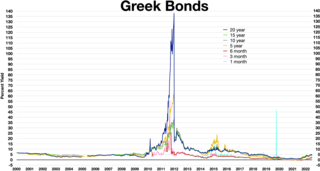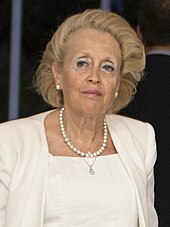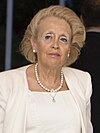
Petros G. Molyviatis is a Greek politician and diplomat who served three times as Minister for Foreign Affairs from 2004 to 2006, May to June 2012, and August to September 2015.

The Third Hellenic Republic is the period in modern Greek history that stretches from 1974, with the fall of the Greek military junta and the final confirmation of the abolishment of the Greek monarchy, to the present day.

Alexis Tsipras is a Greek politician who served as Prime Minister of Greece from 2015 to 2019.
European Parliament elections were held in Greece on 25 May 2014 to elect the 21 Greek members of the European Parliament. The number of seats allocated to Greece declined from 22 to 21, as a result of the 2013 reapportionment of seats in the European Parliament.

The Greek government-debt crisis began in 2009 and, as of November 2017, was still ongoing. During this period, many changes had occurred in Greece. The income of many Greeks has declined, levels of unemployment have increased, elections and resignations of politicians have altered the country's political landscape radically, the Greek parliament has passed many austerity bills, and protests have become common sights throughout the country.

Legislative elections were held in Greece on Sunday, 20 September 2015, following Prime Minister Alexis Tsipras' announced resignation on 20 August. At stake were all 300 seats in the Hellenic Parliament. This was a snap election, the sixth since 2007, since new elections were not due until February 2019.
The following lists events that happened during 2015 in Greece.

Following his victory in legislative elections held on 25 January 2015, the newly elected prime minister Alexis Tsipras appointed a new cabinet to succeed the cabinet of Antonis Samaras, his predecessor. A significant reshuffle took place on 17 July 2015.

Euclid Stefanou Tsakalotos is a Greek economist and politician who was Minister of Finance of Greece from 2015 to 2019. He was also a member of the Central Committee of Syriza and has represented Athens B in the Hellenic Parliament since May 2012. He left Syriza in November 2023 and on 5 December 2023 he became founding member of New Left (Greece) parliamentary group.

Nikos Xydakis is a Greek journalist, art critic, and left-wing politician. From 27 January to 28 August 2015, he served as the Alternate Minister for Culture in the cabinet of Alexis Tsipras. From 23 September 2015 to 5 November 2016, he served as the Alternate Foreign Minister for European Affairs.
George Chouliarakis, also transliterated as Giorgos Houliarakis, is a Greek academic and politician who served as an Alternate Minister of Finance in the Second Cabinet of Alexis Tsipras, serving under Euclid Tsakalotos. Chouliarakis was formerly the interim Minister of Finance in the caretaker government led by Vassiliki Thanou-Christophilou.
Olga-Nadia Valavani is a Greek politician and economist. She was appointed to the role of Alternate Minister of Finance in the cabinet of Alexis Tsipras on 27 January 2015. She resigned from this role on 15 July 2015, before a significant vote on the terms of a bailout package in the Hellenic Parliament.

Maria Kollia Tsaroucha is a Greek politician from Serres. She was Deputy Minister for Macedonia and Thrace and later Deputy Minister for National Defence between 2015 and 2019 in the First and Second Cabinets of Alexis Tsipras. She was also a Member of Parliament with New Democracy and the Independent Greeks from 2000 to 2019, during which she was Deputy Speaker of the Hellenic Parliament from 2012 to 2015.
Tryfon Alexiadis is a Greek politician and tax collector. He is currently an Alternate Minister of Finance in the second Tsipras cabinet, having succeeded Nadia Valavani on 17 July 2015, and served continuously during the first Tsipras cabinet and the Vassiliki Thanou-Christophilou caretaker cabinet.

Vasiliki Thanou-Christophilou, also known as just Vasiliki Thanou, is a Greek judge who served as caretaker prime minister of Greece from 27 August to 21 September 2015, in the run-up to the September 2015 legislative election. She was the first-ever female Greek prime minister and the 98th officeholder since 1822.
Dimitris Papangelopoulos is a Greek lawyer and politician who served as Alternate Minister of Corruption Issues in the Second Cabinet of Alexis Tsipras.
Christos Zois is a Greek politician. He is currently the leader of NEA MERA, and Deputy Chairman of the Union for the Homeland and the People.

Ioannis Mouzalas is a Greek obstetrician-gynecologist, surgeon and one of the founding members of the Greek chapter of Doctors of the World.

The Second Cabinet of Alexis Tsipras was sworn in on 23 September 2015, following the Greek legislative election in September 2015. Alexis Tsipras, leader of Syriza, was sworn in as Prime Minister of Greece on 21 September, having agreed to re-form the coalition with Panos Kammenos and the Independent Greeks.













